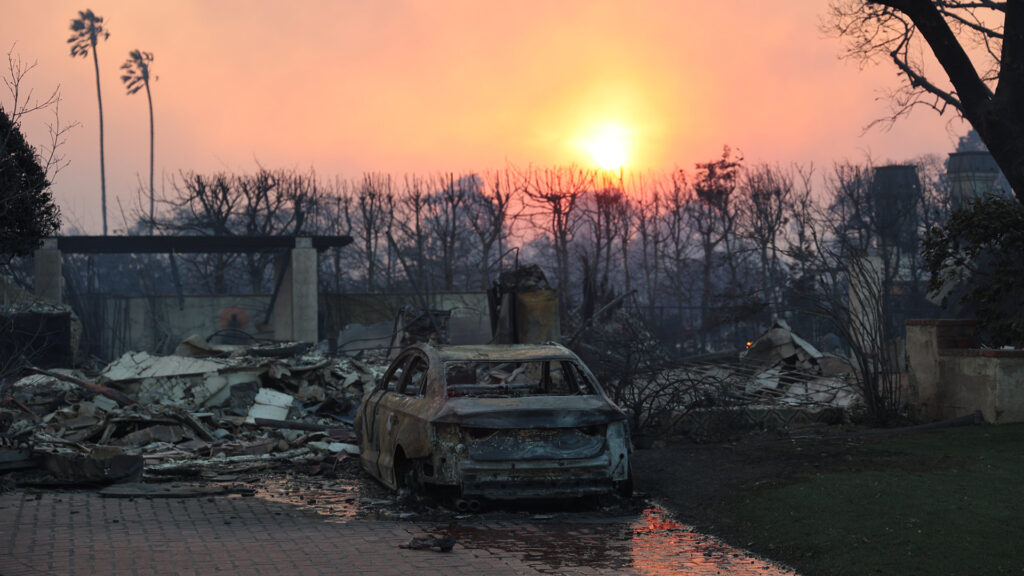Rebuilding from California’s recent wildfires will cost more than a quarter of a trillion dollars — an unprecedented amount. The estimated damage from Hurricane Helene in the Southeast is almost as much, on the order of $250 billion.
Who will pay for that damage? It’s a question plaguing localities around the country as climate change makes these disasters increasingly common.
Some states are landing on a straightforward answer: fossil fuel companies.

The idea is inspired by the “superfunds” used to clean up industrial accidents and toxic waste. The Superfund program goes back to 1980, when Congress passed the Comprehensive Environmental Response, Compensation, and Liability Act (CERCLA). The law fined polluters to finance the clean up of toxic spills.
Thanks to the hard work of groups such as the Vermont Public Interest Research Group and Vermont Natural Resources Council, Vermont recently became the first state to establish a climate superfund in May 2024.
Months later, New York followed suit, again in response to pressure from environmental groups. Both bills require oil and gas companies to pay billions into a fund designated for climate-related cleanup and rebuilding.
Now California is considering a similar law in the wake of its disastrous wildfires. Maryland, Massachusetts and New Jersey may take up the idea as well.
It’s an idea whose time has come, especially now that states are less able to rely on the federal government. The Trump administration is disabling government agencies such as the Federal Emergency Management Agency (FEMA) with major cuts and putting conditions on other aid.
At the recent Conservative Political Action Committee (CPAC) conference, Trump aide Ric Grenell unabashedly endorsed “squeezing” California’s federal funds unless they “get rid of the California Coastal Commission.” (Trump apparently hates the commission, the Fresno Bee explains, because it prevents “wealthy people from turning public beaches into private enclaves.”)
Fossil fuel companies — the lead perpetrators of climate disasters — spent more than $450 million to elect their favored candidates, including Trump. In return, Trump has promised to speed up oil and gas permits and stacked his cabinet with oil-friendly executives.
Why should taxpayers have to foot the bill to clean up the destruction wrought by this industry, one of the most profitable the world has ever known? As a spokesperson for New York Governor Kathy Hochul said, “corporate polluters should pay for the wreckage caused by the climate crisis — not every day New Yorkers.”

Not surprisingly, 22 Republican-led states disagree. They’ve sued to block New York’s law and protect oil and gas profits at the expense of ordinary people. They have no answer for the question of who pays for recovery from climate disasters or helps people reeling from one disaster after another.
Fossil fuel companies can think of paying into a climate superfund as the cost of doing business. If they’re in the business of extracting and selling a fuel that destroys the planet, it’s only fair they pay to clean up the damage.
And the public agrees. Data For Progress found more than 80% of voters support holding fossil fuel companies responsible for the impact of carbon emissions.
To be fair, a climate superfund is a “downstream” solution to the climate crisis, one that seeks to raise the costs to perpetrators. A climate superfund can pay to rebuild homes, but it cannot replace priceless family heirlooms or undo the trauma of surviving a disaster. Most of all, it cannot bring back lives lost. It is only one tool in a multi-pronged tool box to end the climate crisis.
Upstream solutions centering the prevention of climate change — that is, reducing carbon emissions at their source — must be at the center of our fight if humanity is to survive. But in the meantime, fossil fuel polluters should pay.
Sonali Kolhatkar is the host of “Rising Up With Sonali,” a television and radio show on Free Speech TV and Pacifica stations. This op-ed was distributed by OtherWords.org and originally published at https://otherwords.org/who-should-pay-for-climate-disasters/. Banner photo: Firefighters respond to the Palisades Fire in Los Angeles (iStock image).
Sign up for The Invading Sea newsletter by visiting here. To support The Invading Sea, click here to make a donation. If you are interested in submitting an opinion piece to The Invading Sea, email Editor Nathan Crabbe at nc*****@*au.edu.




80% of our people approve.
22 states don’t.
Please explain this further.